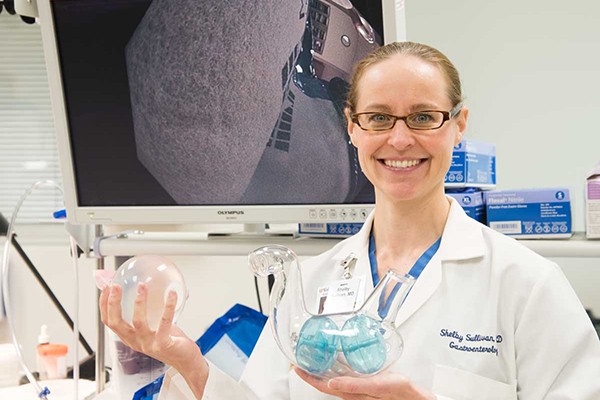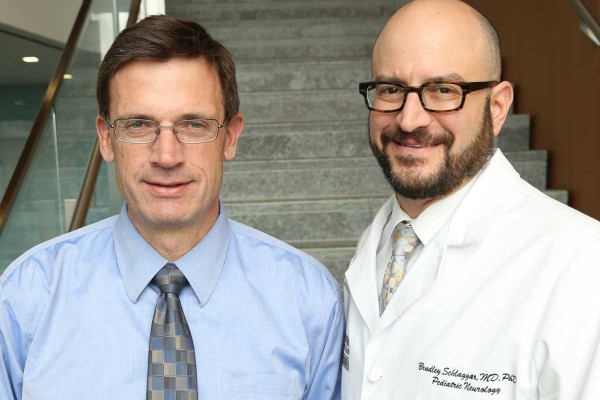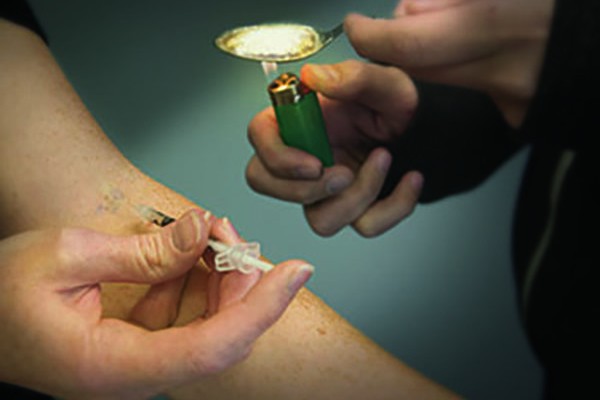New for weight loss: balloon therapy
Washington University School of Medicine in St. Louis and Barnes-Jewish West County Hospital are offering a newly approved, nonsurgical therapy to help people lose weight. Shelby Sullivan, MD, holding models of the two systems being used, said the therapy involves placing special balloons into the stomach and inflating them to give patients the feeling of being full after eating small meals.
Genes influence choice between small rewards now or bigger ones later
Opting for smaller rewards immediately instead of waiting for bigger payoffs later is associated with problems such as impulsivity and addiction to food, drugs and alcohol. School of Medicine researchers led by Andrey Anokhin, PhD, are reporting that such decision-making tendencies have a genetic link to brain pathways that underlie those disorders.
$6.5 million to fund research, treatment of developmental disabilities
Researchers at the School of Medicine have received a five-year, $6.5 million grant to study the physiological underpinnings of developmental disabilities in children and to use the findings to search for novel ways to improve such children’s lives. The grant renews funding for the university’s Intellectual and Developmental Disabilities Research Center (IDDRC), which is directed by John N. Constantino, MD (left) and Bradley L. Schlaggar, MD, PhD.
Constantino, Luby receive awards from child psychiatry academy
The American Academy of Child and Adolescent Psychiatry (AACAP) has honored Washington University child psychiatrists John N. Constantino, MD, and Joan L. Luby, MD, for their pioneering research with children.
On the rise: Painkiller abusers who also use heroin
Drug abusers are not completely abandoning prescription opioids for heroin, according to School of Medicine researchers. Instead, many use the two concurrently based on their availability. The researchers’ findings also reveal regional variations in the use of heroin and prescription painkillers.
Trial to study if smoking-cessation therapy can be tailored to smokers’ DNA
A School of Medicine study may aid efforts to tailor smoking-cessation treatments to individual cigarette smokers. Researchers are recruiting 720 smokers whose DNA samples, from saliva, will be analyzed to identify genetic variations that influence smoking behavior, lung cancer risk and the effectiveness of smoking-cessation treatments.
Eye’s recycling process key to seeing color, bright light
The retina’s rods and cones allow us to see. But although scientists have an idea of what makes rods perform and flourish, they’ve been somewhat in the dark regarding what keeps cones working and thriving. Now, School of Medicine researchers led by Thomas A. Ferguson, PhD, believe they’re closer to the answer and that their findings may one day help preserve vision in patients with age-related macular degeneration and other retinal diseases.
Methadone’s side effects, efficacy may be linked to genetic makeup
Methadone — long used to treat pain and addiction — can be lethal if it lingers too long in the body. New research led by the School of Medicine’s Evan D. Kharasch, MD, PhD, has identified genetic subtypes in people that govern methadone clearance, findings that could help prevent some of the 5,000 methadone-related deaths that occur each year in the United States.
Premature birth appears to weaken brain connections
Babies born prematurely face an increased risk of neurological and psychiatric problems that may be due to weakened connections in brain networks linked to attention, communication and the processing of emotions, according to new School of Medicine research led by Cynthia Rogers, MD.
Kharasch named editor-in-chief of journal Anesthesiology
The American Society of Anesthesiologists has named Evan D. Kharasch, MD, PhD, of the School of Medicine, the new editor-in-chief of the journal Anesthesiology. Kharasch will assume the role of editor-in-chief-elect on Jan. 1, 2016, and then officially take on full editorial responsibility July 1.
View More Stories





